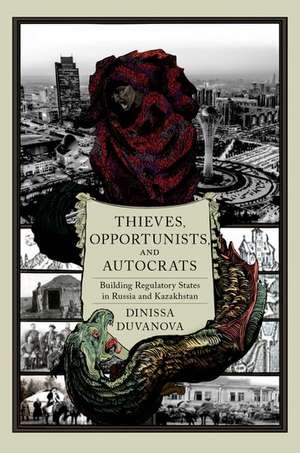Thieves, Opportunists, and Autocrats: Building Regulatory States in Russia and Kazakhstan
Autor Dinissa Duvanovaen Limba Engleză Paperback – 18 oct 2023
Preț: 136.80 lei
Preț vechi: 155.74 lei
-12% Nou
Puncte Express: 205
Preț estimativ în valută:
26.18€ • 28.45$ • 22.01£
26.18€ • 28.45$ • 22.01£
Carte disponibilă
Livrare economică 20-26 martie
Livrare express 15-21 martie pentru 47.43 lei
Preluare comenzi: 021 569.72.76
Specificații
ISBN-13: 9780197697771
ISBN-10: 0197697771
Pagini: 336
Dimensiuni: 234 x 160 x 20 mm
Greutate: 0.48 kg
Editura: Oxford University Press
Colecția OUP USA
Locul publicării:New York, United States
ISBN-10: 0197697771
Pagini: 336
Dimensiuni: 234 x 160 x 20 mm
Greutate: 0.48 kg
Editura: Oxford University Press
Colecția OUP USA
Locul publicării:New York, United States
Recenzii
This manuscript is packed with superb insights, interesting findings, innovative methods, and valuable data. It seeks to reveal the agency and discretion that bureaucrats and other regulatory actors retain and strategically deploy within authoritarian regimes and explores how their actions interact with important political economy outcomes. Above all, it shows the highly complex and conditional effects of "regulatory reforms" when they are uncritically introduced in authoritarian settings where politicians face trade-offs to retain power and distribute patronage to clients and allies.
Thieves, Opportunists and Autocrats is a fascinating, rich, and complex book that makes multiple contributions to the literatures on political economy and the former Soviet Union. The study, which provides a great review of Russia and Kazakhstan's post-Soviet economic history, reveals how economic regulations, institutional politics, and business-state relations together determine the nature and effectiveness of autocratic governance with ramifications for states across the globe.
Thieves, Opportunities and Autocrats is a fascinating and extremely well-researched study of how authoritarian elites use very modern bureaucratic techniques for the purposes of control and co-optation. Duvanova provides more evidence that the neoliberal model of bureaucracy, which has spread across the world in recent decades, is entirely compatible with authoritarian rule. The book is a must-read for anyone working on public policy or comparative political economy of non-democracies.
Thieves, Opportunists and Autocrats is a fascinating, rich, and complex book that makes multiple contributions to the literatures on political economy and the former Soviet Union. The study, which provides a great review of Russia and Kazakhstan's post-Soviet economic history, reveals how economic regulations, institutional politics, and business-state relations together determine the nature and effectiveness of autocratic governance with ramifications for states across the globe.
Thieves, Opportunities and Autocrats is a fascinating and extremely well-researched study of how authoritarian elites use very modern bureaucratic techniques for the purposes of control and co-optation. Duvanova provides more evidence that the neoliberal model of bureaucracy, which has spread across the world in recent decades, is entirely compatible with authoritarian rule. The book is a must-read for anyone working on public policy or comparative political economy of non-democracies.
Notă biografică
Dinissa Duvanova is Associate Professor in International Relations at Lehigh University. Her research focuses on the political economy, bureaucratic politics, and technology-enabled forms of political participation in Russia, Eastern Europe, and Central Asia. Her publications appear in British Journal of Political Science, Comparative Politics, Journal of Comparative Economics and World Development and other journals. Her book Building Business in Post-Communist Russia, Eastern Europe and Eurasia: Collective Goods, Selective Incentives, and Predatory States (Cambridge University Press, February 2013) was awarded the Ed A. Hewett Prize for outstanding publication on the political economy of Russia, Eurasia and/or Eastern Europe.
